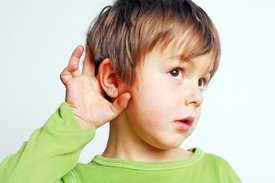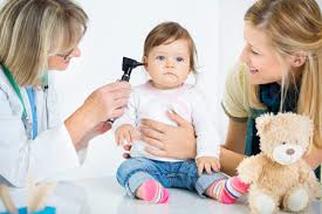
Does your child have frequent ear infections or bad seasonal allergies? If your child has these issues, they may end up with buildup of fluid in their ears. The fluid in your child’s ears blocks sound from making it efficiently and clearly into their inner ear (where the actual hearing is done) causing hearing issues. Difficulty with hearing sounds can negatively impact your child’s total communication development (meaning: speech development, language development and even social development!). If your child is not hearing how sounds are made correctly, they will likely have difficulty imitating sounds and words.
As we discussed in a previous post, children start their engagement and communication early on, so interference with your child’s hearing can impact their development, particularly as they get older. Not only can their speech development (i.e., learning how to produce sounds correctly) become impacted, but their language development and social development can become stunted. Think of your child’s early years as practice for these type of skills (speech, language and social skills) for later in their childhood and even later life. If your child is not able to practice their skills, how will they be able to correctly use the skills they haven’t been able to practice?? After all, practice makes progress!

If you have concerns about your child’s ability to hear correctly, it is vital that you get their hearing checked out! You can speak to your pediatrician about your concerns and they may refer you to a pediatric audiologist or ENT. ASHA also has an online catalog of certified audiologists all over the country. Another resource is the Early Hearing Detection & Intervention – Pediatric Audiology Links to Services (EHDI-PALS).
Red-Flags that your child may have issues with their hearing:
- frequent ear infections
- their ears seem “wet” frequently
- very bad seasonal allergies
- limited babbling and/or jargon as an infant
- delayed first words
- not using a variety of sounds (with babbling, jargon and their imitations/words)
- their speech sounds “slushy” or “nasally”
- not responding when you call their name (multiple times)
- seem to only react to what is in front of them or what they can see
If your child does have hearing issues due to fluid, your pediatrician and audiologist will determine the course of action to address their hearing loss; however, it is likely your child may need speech therapy as a result of the time they were not hearing correctly. Many of the children we work with at The Speech Space end up doing very well and can quickly progress through therapy once the fluid in their ears is no longer present. There is no harm in getting it checked out– better safe than sorry!
Feel free to reach out to us at The Speech Space if you are having concerns about your child’s development. We offer free screenings, which take approximately 30 minutes, and can help identify potential problems! Additonal Resources:
Great article from ASHA on the causes of hearing loss in children
